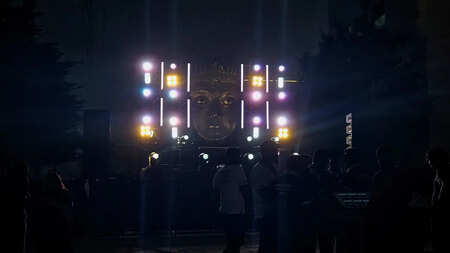Robert T. Kiyosaki's "Rich Dad Poor Dad" changed the way I saw money
Times of Bennett | Updated: Apr 15, 2023 15:15

By Arka Naskar
Rich Dad Poor Dad is a book written by Robert Kiyosaki that was first published in 1997. It is a personal finance book that talks about the author’s own experiences that offers a unique perspective on personal finance and wealth-building. The book tells the story of two fathers - the author's own father (Poor Dad) and his best friend's father (Rich Dad ) - and how their differing attitudes towards money and wealth impacted the author's own financial education and success.
The book is an easy read and is divided into 10 chapters that cover various aspects of personal finance. The author's Poor Dad was a highly educated man, with a Ph.D. and a successful career as an educator, however, he struggled with money and lived pay check to paycheck, always feeling like he was one emergency away from financial ruin. In contrast, the author'sRich Dad never finished high school, but was a highly successful entrepreneur who built a vast business empire and became wealthy.
One of the main themes of the book is the importance offinancial education in our education system. Kiyosaki argues that the school system does not teach us how to manage our money and that we need to educate ourselves in order to achieve financial success. He also belives that a child should be taught financial education from its house itself.He also stresses the importance of taking control of our own financial future and not relying on others, such as employers or the government, to provide for us.
Another important lesson from the book is the difference between assets and liabilities.Kiyosaki defines assets as things that put money in our pocket and liabilities as things that take money out of our pocket. He encourages readers to focus on acquiring assets and minimizing liabilities in order to build wealth.
One of the key takeaways fromRich Dad Poor Dad is the importance of thinking differently about money and wealth. The author encourages readers to shift their mindset from the traditional "get a good job and work hard" mentality to one of building assets and generating passive income. He emphasizes the importance of financial literacy, urging readers to learn the language of money and take control of their financial future.
One of the most controversial ideas in the book is Kiyosaki’s view on homeownership. He argues that a house is not an asset, but rather a liability because it takes money out of our pocket in the form of mortgage payments, property taxes, and maintenance costs. While this view may not be popular among traditional financial advisors, Kiyosaki makes a compelling argument for why homeownership may not be the best investment for everyone.
Another important lesson from the book is the idea of making your money work for you. The author encourages readers to invest in assets that generate passive income, such as rental properties or dividend-paying stocks, rather than relying solely on earned income from a job. He also stresses the importance of minimizing liabilities and living below your means in order to free up more resources for investing
Overall, I foundRich Dad Poor Dad to be an informative and thought-provoking book. While not all of Kiyosaki’s ideas may be applicable to everyone’s financial situation, the book provides a valuable perspective on personal finance that is often overlooked in traditional education. The author's storytelling style makes the book engaging and easy to read, while the lessons he shares are both practical and thought-provoking. While some of the advice may not be applicable to everyone, particularly those with limited resources, the book provides valuable insights that can be applied in a variety of financial situations.
One criticism of the book is that it can come across as overly simplistic at times, and some of Kiyosaki’s claims are not backed up with solid evidence. Additionally, some readers may be put off by Kiyosaki’s emphasis on entrepreneurship and his somewhat negative view of traditional employment.
Despite these criticisms, I believe thatRich Dad Poor Dad is a book that everyone can benefit from reading. It provides a fresh perspective on personal finance that is both accessible and thought-provoking. , however, Rich Dad Poor Dad is a worthwhile read for anyone looking to improve their financial literacy and take control of their financial future. The book provides valuable insights and practical advice that can help readers build wealth and achieve their financial goals.
The book is an easy read and is divided into 10 chapters that cover various aspects of personal finance. The author's Poor Dad was a highly educated man, with a Ph.D. and a successful career as an educator, however, he struggled with money and lived pay check to paycheck, always feeling like he was one emergency away from financial ruin. In contrast, the author's
One of the main themes of the book is the importance of
Another important lesson from the book is the difference between assets and liabilities.
One of the key takeaways from
One of the most controversial ideas in the book is Kiyosaki’s view on homeownership. He argues that a house is not an asset, but rather a liability because it takes money out of our pocket in the form of mortgage payments, property taxes, and maintenance costs. While this view may not be popular among traditional financial advisors, Kiyosaki makes a compelling argument for why homeownership may not be the best investment for everyone.
Another important lesson from the book is the idea of making your money work for you. The author encourages readers to invest in assets that generate passive income, such as rental properties or dividend-paying stocks, rather than relying solely on earned income from a job. He also stresses the importance of minimizing liabilities and living below your means in order to free up more resources for investing
Overall, I found
One criticism of the book is that it can come across as overly simplistic at times, and some of Kiyosaki’s claims are not backed up with solid evidence. Additionally, some readers may be put off by Kiyosaki’s emphasis on entrepreneurship and his somewhat negative view of traditional employment.
Despite these criticisms, I believe that







